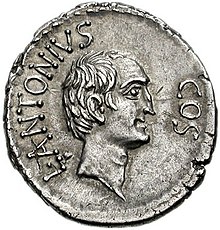Lucius Antonius
Lucius Antonius was a late republic Roman politician and brother of the triumvir Mark Antony .
Lucius was the youngest son of Mark Antony Creticus and Iulia , a cousin of Gaius Iulius Caesar , and a grandson of the orator Mark Antony Orator , who was supported by followers of Gaius Marius in 86 BC. Was executed. Together with his brother Gaius he was in 54 BC. One of the accusers of the consular Aulus Gabinius . 50 BC Lucius held the office of quaestor in the province of Asia under the propaetor Quintus Minucius Thermus . When he left the province, presumably at the beginning of the following year, Lucius Antonius took over the governorship as Proquaestor and initially remained there under the new Propraetor Gaius Fannius .
Lucius supported his brother Marcus, one of the most important confidants of the dictator Caesar, who was victorious in the civil war. 44 BC BC, in the year of his brother's consulate , he was tribune of the people and introduced a law that gave Caesar the right to determine half of all magistrates himself. After Caesar's assassination, Lucius became chairman of a seven-man commission to redistribute public land to veterans and landless citizens. At the end of the year he went to his brother in northern Italy and supported him, probably as a legate , in the Mutinensian war against the Senate.
41 BC BC Lucius was consul with Publius Servilius Isauricus . On the first day of the year he celebrated a triumphal procession for victories against Alpine peoples. That year he assisted Fulvia , his brother Marcus' wife, in raising eight legions to fight Octavian's unpopular policies. After a successful occupation of Rome, the conflict known as the Peruvian War ended in the winter of 41/40 BC. In Perusia , when Lucius and Fulvia were besieged and had to give up because of hunger. Octavian destroyed the city, but spared the leaders of the rebellion. Fulvia and Lucius Antonius, who had accepted the Cognomen Pietas as a sign of loyalty to his brother , were merely banished. Lucius went to Spain and then no longer appears in the sources.
literature
- Elimar Klebs : Antonius 23 . In: Paulys Realencyclopadie der classischen Antiquity Science (RE). Volume I, 2, Stuttgart 1894, Col. 2585-2590.
- Hans Georg Gundel : Antonius I. 4. In: The Little Pauly (KlP). Volume 1, Stuttgart 1964, Col. 410.
Remarks
- ^ Cassius Dio 48, 5, 4.
| personal data | |
|---|---|
| SURNAME | Antonius, Lucius |
| ALTERNATIVE NAMES | Antonius Pietas, Lucius |
| BRIEF DESCRIPTION | Roman politician |
| DATE OF BIRTH | 1st century BC Chr. |
| DATE OF DEATH | 1st century BC Chr. |
